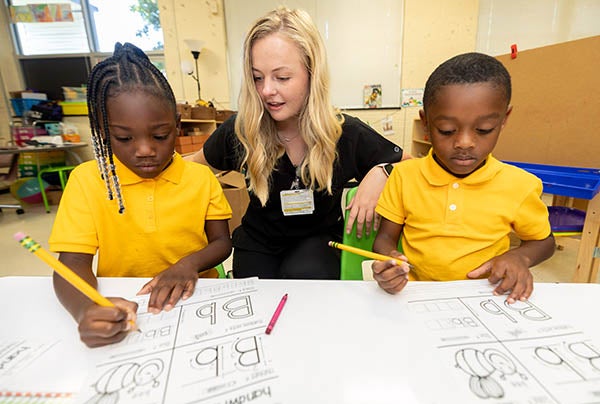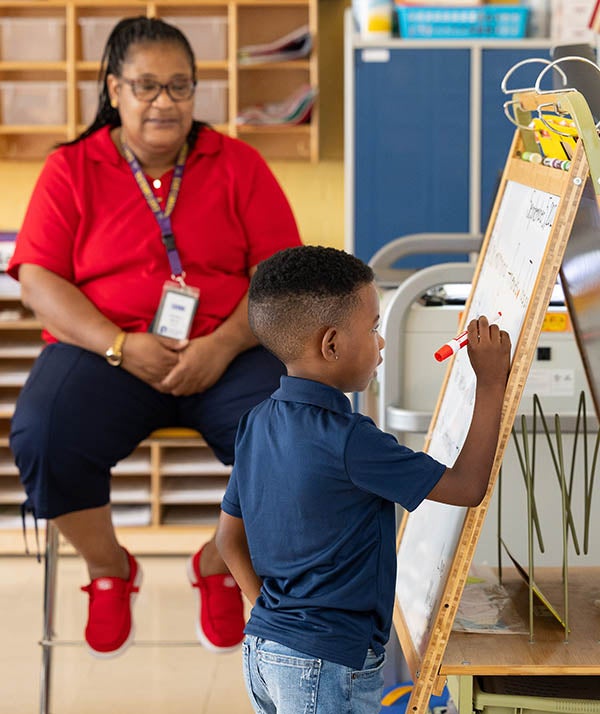K-12 performance grades show growth, literacy success for ECU Community School
The North Carolina Department of Public Instruction K-12 school performance grades from the 2022-23 academic year tell a story of success for the East Carolina University Community School. This year marks the first that the school does not have the designation of a low-performing school.

ECU speech-language pathology students work with kindergarten students at the ECU Community School. Partnerships with colleges and departments across the university help ECU Community School students find success in the classroom. (Photos by Rhett Butler)
“We are extremely thankful and excited at the Community School,” said Tracy Cole, school principal. “The staff has really pulled together and they are focused on creating the best learning experiences possible for our children.”
According to state statutes, low-performing schools receive either a D or F on yearly performance reports and will either meet or not meet expected growth. With its performance grade of C, the ECU Community School no longer carries that designation.
“Our teachers are assessing the children’s needs and developing lessons to meet them at their point of need,” Cole said. “They’re teaching and then assessing them again to see what things they did well on and to see what areas they need to work on. After going through that continuous cycle all school year, you’re able to see the rewards of that and see the growth of the children.”
The school has shown a consistent pattern of growth over the last couple of years. During the 2021-22 academic year, the school increased its proficiency score from an F rating to a D. Performance grades are based on end-of-grade (EOG) test scores in reading and math, as well as science for fifth and eighth grades. The state has a formula to calculate whether students are making expected growth and how they are performing according to state grade-level standards.
“The College of Education looks forward to continuing to support the Community School in becoming a model school for student engagement and achievement,” said Dr. André Green, College of Education dean. “From where we started to where we are now shows the dedication of the teachers and principal in creating a climate of success for students. Like ECU and the College of Education, the Community School is future focused and innovation driven.”
The ECU Community School opening in August 2017 as part of an initiative created by the UNC System to open laboratory schools across the state as training sites for future teachers and administrators. UNC System laboratory schools are designed to work with children who are either academically at-risk or zoned to attend a low-performing school.
One of the areas the school has focused on is strengthening literacy practices. The school partnered with the literacy studies program in the College of Education and Dr. Kim Anderson, an associate professor in literacy studies. Anderson worked directly with teachers and students to assess literacy levels and coordinate lessons to meet the needs of students in addition to pulling appropriate resources from the school’s resource room.

School performance grades show marked improvement for the ECU Community School.
An initiative that was particularly beneficial was the introduction of literacy stations. Teachers, teacher assistants and volunteers would run small groups in the classroom focused on reading.
“When you have those stations, you can work with a small number of students at a time to get them that more personalized attention,” Cole said.
In addition to Anderson’s work, AmeriCorps volunteers and College of Education students worked with Community School students to strengthen their literacy, and an after-school tutorial program was created.
“We received funding from The Lookout Foundation that helped support hiring ECU student tutors to work the after-school tutorial program,” Cole said. “We were able to provide transportation to our children. After the tutoring program was done, the bus would take them home, because we didn’t want transportation to be a barrier.”
The focus on literacy paid. The school met 100% of the long-term reading goals set by the state.
With solid literacy programming in place, the school is now shifting to focus on math with the help of Drs. Katie Schwartz and Carrie Lee in the ECU Department of Mathematics Education, Science Education and Instructional Technology. They’re currently discussing the needs of the school and how to align the curriculum so that each year of education will build upon what was taught the previous year.
“The children that we work with, not only at the Community School, but across the country and across the state, they learn differently than when I was in school,” Cole said. “We have to adapt our teaching strategies so that it is engaging, and they want to learn and they want to know more.”
MORE BLOGS